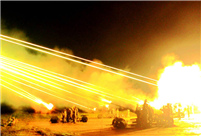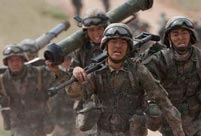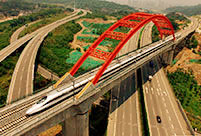

by Jon Day
TOKYO, June 10 (Xinhua) -- Much has been written and said of late about Prime Minister Shinzo Abe's bellicose moves to recast and normalize the nation's military and allow forces here a borderless rein to engage in global conflicts, be it preemptively or defensively, deemed to compromise Japan's security, national interests or those of its allies.
The Japanese leader has come under fire for almost whimsically making unilateral decisions on the future of Japan's security policy, particularly pertaining to what he describes as an " increasingly severe situation in the East Asian region" -- a turn of phrase Abe believes gives him carte blanche to act autonomously whenever he utters it -- and for bypassing legislative charters as fundamental and basic as the nation's own Constitution and parliamentary edicts that exist to protect the public from such over zealous monocrats.
Indeed, the list of Abe's political shortcuts taken to effectively reverse seven decades of adherence to a chartered pacifist ideology and fire up Japan's old militaristic war machine, is as lengthy as it is injudicious, at least in the eyes of the Japanese people he purports to and has sworn to serve yet merely spurns on his way to writing the future annals of his own history, as one of Japan's most influential, albeit jingoistic leaders.
But for Abe and his clique of likeminded ultra-nationalists, personal egos and legacies aside, there is an old driving force, once thought stamped out at the end of World War II, that is once again heavily influencing today's neo-nationalistic politics and trying to broaden its reach into mainstream society in a bid to create a "new dawn" for Japan; a utopia in which losing WWII is a fallacy and hence apologies to those brutalized needless; one which sees Japanese people elevated to being a superior race in the world with such an ideology being strongly perpetuated though educational and media indoctrination, among others.
"Prime Minister Shinzo Abe... has always wanted to revise three of the country's basic modern charters: the 1946 Constitution, the education law, which undervalues patriotism, and the nation's security treaty with the United States. The Emperor would be returned to a more prominent place in Japanese society. The special status of Yasukuni Shrine, which enshrines most of Japan's war dead, including the men who led the nation to disaster between 1933 and 1945, would be restored," said David McNeill, an internationally-renown political pundit and lecturer at Sophia University in Tokyo, in a recent editorial on the matter.
The controversial Yasukuni Shrine, while honoring hundreds of thousands of war dead also enshrines the souls of 14 Class-A war criminals including Iwane Matsui, the main architect of the Nanjing massacre of about 300,000 unarmed Chinese men, women and children within a period of a few weeks, beginning on Dec. 13, 1937.
According to the Center for Research on Globalization (CRG), " The grave of Matsui is only one of more than 14 Class-A war criminals given honored burial at the Yasakuni Shrine. He lies in state among the graves of other Japanese war criminals who presided over horrific atrocities perpetrated elsewhere in China, the Korean Peninsula, Malaysia, and throughout Asia. The slaughter in China alone during the 1931-1945 Japanese aggression exceeds 35 million Chinese citizens," said the Montreal-based independent research and media organization.
While Abe himself has refrained from visiting the shrine in person since his ill-conceived homage there to glorify Japan's war criminals in 2013, numerous members of his Cabinet and countless lawmakers have paid their respects. The prime minister himself, however, on festivals marked by the shrine, has made ritual offerings to the war dead, by way of a proxy.
"If Prime Minister Abe's visit to the notorious Yasakuni shrine had been an isolated incident, it could have been attributed to gross insensitivity, stupidity and arrogance. But that visit was not an isolated incident, and heralded dangerous tendencies. The glorification of Japanese war criminals reveals the Japanese Prime Minister's failure to experience and express remorse and guilt, and a failure to accept the obligation to atone for those heinous actions," the CRG stated in a discourse on the issue, adding "This failure to express remorse reveals a dangerous tendency to repeat these crimes."
This failure to express remorse and face history squarely is the very crux of the new ideology State Shinto is trying to revive, as Mark Mullins, director of the Japan Studies Center at the University of Auckland, quoted by McNeill, explains.
"They're trying to restore what was removed by the U.S. Occupation reforms. If it succeeds, the project amounts to the overturning of much of the existing order in Japan -- a return to the past, with one eye on the future."
McNeill himself goes on to explain that a number of Japan's highest elected officials are currently members of Shinto Seiji Renmei (the Shinto Association of Spiritual Leadership), with the Shinto Political Alliance Diet Members' Association, its sister organization, also comprising around 250 lawmakers, including the majority of Abe's Cabinet, with Abe himself standing as the association's secretary-general.
Political pundits not duped by Abe's smoke and mirror politics, that has often involved a style of diplomacy that has seen the hawkish leader offer an olive branch of reconciliation to neighboring countries wronged by Japan in the past in one hand, while hiding a dagger behind his back in the other, concur that not only is a reemergence of State Shinto actually happening, its gaining traction and fast-becoming a dominant political influence here.
According to Dr. Jill Carroll, a Houston-based scholar, writer and speaker who specializes in world religions and world politics, "State Shinto is a term that refers to the use of Shinto traditions and beliefs to support Japanese nationalism in the late 19th century and early 20th century..."
"Within this mindset, it was determined that Shinto was the most authentically Japanese form of religion and culture, and that it was fundamental to Japanese identity at the national level. Shinto became the state religion, and was used to promote a distinct ideology of Japanese superiority," the Adjunct Associate Professor in the Department of Religious Studies at Rice University explained.
"Passages from Shinto mythology were appropriated to support the Emperor's divine status via his direct lineage back to Amaterasu (sun goddess), the racial superiority of the Japanese people and the general superiority of their land because of their divine origins. Moreover, these supremacist ideologies were taught in school curricula and in public civic life," said Carroll.
She added that Japanese nationalism continued into the 1930s and 1940s where it culminated in World War II, although State Shinto, as it was known, was disbanded after the Allied powers won the war, defeating Japan, and the Americans occupied Japan.
And while Emperor Hirohito in 1946 renounced this political, ideological interpretation of Shinto in a public radio address, to the nation in the "Declaration of Humanity" and denounced his own divinity as well as the racial superiority of Japanese people, nearly seven decades after the end of WWII, the right-wing government of Abe is returning to such pre-war notions of nationalism and supremacy, as well as the denial of history.
"Abe is rapidly remilitarizing Japan, freeing its armed forces from any legal or constitutional constraints and revising history to whitewash the past crimes and atrocities of Japanese imperialism. (He) has been engaged in an ideological offensive that was marked by his visit to the notorious Yasukuni Shrine to Japan's war dead, including 14 convicted Class-A war criminals. The same month, he appointed four right-wing figures to the board of governors of Japan's public broadcaster NHK in order to shift its political orientation," the CRG highlighted.
"The purpose of the appointments quickly become apparent... NHK chairman, Katsuto Momii, triggered a public furore by justifying the systematic abuse of hundreds of thousands of women as sex slaves by the Imperial Army in the 1930s and 1940s... another Abe appointee, Naoki Hyakuta, declared that the Rape of Nanking, one of the worst atrocities of the twentieth century, ' never happened,'" CRG proffered.
"The nationalist not only does not disapprove of atrocities committed by his own side, but he has a remarkable capacity for not even hearing about them," wrote English novelist George Orwell in his 'Notes on Nationalism.'
"This sentiment has also been echoed by Tokyo journalist Kirk Spitzer, who points out that keen observers of Japan know its territorial disputes with its neighbors aren't really about World War II aggression or ancient historical claims. What they are really about is the Japanese inability to admit they did anything wrong during their long colonial rule in Asia," opined Dennis McCornac, a visiting Affiliate Professor at Loyola University Maryland.
"The extent to which Japan interprets its history will impact the actions and policies of the present government and play an important role in promoting a new nationalism that may be considered a watershed for post-war Japanese international relations," McCornac, who specializes in economic development and economies of East Asia, said in an editorial on the matter.
Abe has, since entering office in 2012, systematically set about markedly increasing military spending, foregoing a decades old weapons export embargo, established the highly contentious National Security Council to concentrate foreign and defense policy in his own hands and is currently trying to jam new security legislation through parliament that has been rejected by the public and deemed unconstitutional by numerous leading constitutional lawyers and scholars, all in a bid to revive militarism and further push the truculent State Shinto ideological envelope.
"This revival of militarism is both to prosecute the interests of Japanese imperialism abroad and project outwards, against a foreign "enemy" the tensions produced by the growing social crisis at home. The denial of crimes on the scale of the Rape of Nanking has only one meaning -- it is the ideological preparation for new wars and new atrocities," the CRG concluded.
 School life of students in a military college
School life of students in a military college PLA soldiers operate antiaircraft guns in drill
PLA soldiers operate antiaircraft guns in drill Mysterious “sky road” in Mount Dawagengzha
Mysterious “sky road” in Mount Dawagengzha J-11 fighters in air exercise
J-11 fighters in air exercise Top 16 Chinese cities with the best air quality in 2014
Top 16 Chinese cities with the best air quality in 2014 PLA helicopters travel 2,000 kilometers in maneuver drill
PLA helicopters travel 2,000 kilometers in maneuver drill PLA soldiers conduct 10-kilometer long range raid
PLA soldiers conduct 10-kilometer long range raid Stars who aced national exams
Stars who aced national exams
 Hefei-Fuzhou railway line put into trial operation
Hefei-Fuzhou railway line put into trial operation Pan-democrats must choose wisely for HK
Pan-democrats must choose wisely for HK China's latest air quality threat ground-level ozone
China's latest air quality threat ground-level ozone Duped by extremists
Duped by extremists Rolling through time
Rolling through timeDay|Week